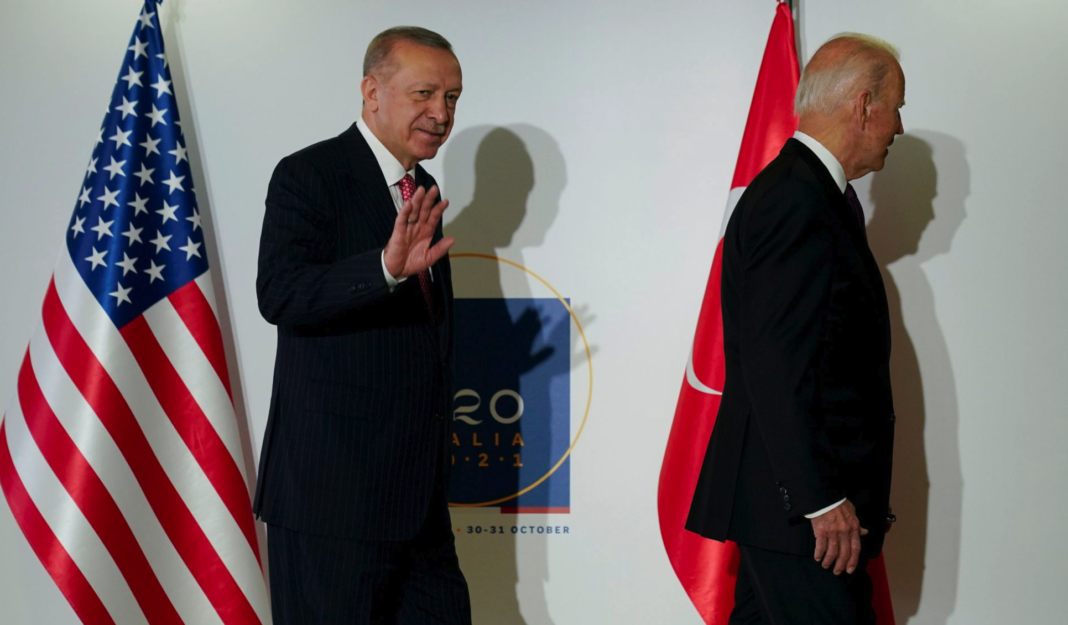If, as is looking increasingly likely, President Recep Tayyip Erdogan of Turkey wins reelection in Sunday’s runoff vote, you can count on three consequences. One: Turkey will continue to drift away from the West. Two: Its economy will continue to spiral downward. And three: The US foreign-policy establishment will recommend that Washington seek accommodation with Ankara, arguing that this would be better than five more years of acrimony. Analysis by Bobby Ghosh in The Washington Post on May 26, 2023.
President Joe Biden’s administration should follow the logic of the first two certainties to reject the reasoning of the third. Rather than rush to conciliate Erdogan, it should dial up economic and diplomatic pressure until he is ready to reset US-Turkish relations.
Nobody in Washington should hold their breath. The Turkish leader has made it clear he has no intention of changing any of his policies, domestic or foreign. In an interview to CNN, Erdogan said he would “absolutely” continue to lower interest rates, despite an abundance of evidence that this has inflicted grievous harm on the economy and turned away investors. He also spoke warmly of his “special” relationship with Russian President Vladimir Putin, repeated his longstanding refusal to enforce sanctions on Russia, and criticized the West for failing to take a “balanced approach” toward Moscow.
It is Erdogan’s approach to foreign policy that has been conspicuously lacking in balance. While building that special relationship with Putin over several years, he has alienated Turkey from its North Atlantic Treaty Organization partners and endangered the alliance’s defenses — most provocatively by purchasing Russian S-400 missile defense systems. He has also antagonized his country’s major trading partners in Europe by threatening to unleash a flood of refugees across Turkey’s western borders.
Throughout the current election campaign, he and other leaders of his Justice and Development Party have blamed the West, and especially at the US, for much of what ails Turkey today.
Optimists will point out that Erdogan has been known to execute sharp reversions in foreign policy: In the past couple of years, he has kissed and made up with Middle Eastern states he had previously estranged, including Saudi Arabia, the United Arab Emirates, Egypt and Israel. Perhaps he would do the same with the US if the Biden administration were to, say, bring Turkey back into the F-35 manufacturing program (it was removed when Ankara bought the S-400), or withdraw American support for Kurdish allies that Erdogan regards as terrorists.
But Erdogan’s Middle East turnarounds were not the result of placation by regional leaders: They were for the most part prompted by his desperation. Having run Turkey’s economy into the ground, he needed the largesse of the Gulf Arabs. And without the indulgence of former US President Donald Trump, he needed Israeli and Egyptian diplomatic assistance in resolving regional disputes.
The lesson from these U-turns for the Biden administration is that in dealing with a truculent Turkey, it pays to wait.
It is hard to know what combination of factors will force Erdogan to seek a reset with the West, but two elements are essential. One is that Turkey will need to reach a level of economic crisis from which even Erdogan’s Arab friends can’t extricate him. The other is that Russia’s conduct in the war in Ukraine makes his special relationship with Putin a liability.
The Biden administration need do little about the first: Erdogan can be counted upon to push the Turkish economy deeper into the hole he has created, and the Arab petrostates will not long extend his rope. As President Abdel-Fattah El-Sisi of Egypt could attest, the Saudis and Emiratis are no longer serving unlimited bailouts.
As for the second, the Biden administration and the Western alliance have been steadfast in backing Ukraine to repel the Russian invasion. The more reversals Putin suffers on the battlefield, the less special his friendship will feel to Erdogan. In the meantime, Washington should maintain pressure on Ankara to stop allowing Moscow access to sanctioned goods. The threat of punitive measures is having some effect: Turkey has recently blocked the transit of some shipments.
If Erdogan wins the runoff on Sunday as expected, the theme of his acceptance speech will be that Turkey is not for turning. Biden should signal that neither is the US.
Analysis by Bobby Ghosh in The Washington Post on May 26, 2023.

